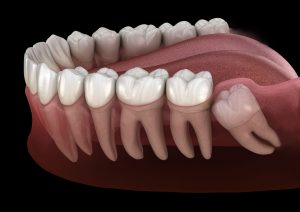
If you have an upcoming wisdom tooth extraction, it’s natural to feel somewhat anxious. Sometimes, though, it’s necessary to have these molars removed because they can do more harm than good. They typically arrive in the back of your mouth when you’re between 17 and 25 years old and are considered unnecessary in our contemporary culture. The past, however, was a different story. Keep reading to learn more about why we have wisdom teeth and why your dentist may need to remove them.
Why Do We Have Wisdom Teeth?
Wisdom teeth are considered a vestigial organ, which means that our ancestors developed them out of a necessity that no longer exists. In days gone by, before we had grocery stores and restaurants, humans had a much coarser diet. Regularly eating harder substances like leaves, roots, nuts, and tough meats resulted in much more wear and tear on our predecessor’s teeth than we cope with today. Plus, there were no utensils to break food into smaller pieces, and so people relied on their pearly whites for that, too. Wisdom teeth likely developed as a fail-safe to allow early humans to be able to bite and chew food after their others had degraded.
What is the Problem with Wisdom Teeth?
Over time, humans’ faces evolved to be smaller, which means that many individuals in our current era simply have no room for these teeth to grow in. This can cause different issues that impact your oral well-being. To prevent this from happening, your dentist may recommend removing them altogether. It’s important to note that not everyone requires a wisdom tooth extraction because people don’t always develop them. Some people develop several wisdom teeth on both sides of their mouth, while others don’t have any at all.
What Dental Problems Do Wisdom Teeth Cause?
Wisdom teeth can be problematic for several reasons. They frequently become impacted, meaning that for whatever reason they don’t break through the gumline correctly. Sometimes this is because they’re blocked by other teeth, but it can also be that they’re facing the wrong direction or are growing in at an inappropriate angle. This can cause symptoms like:
- Pain or sensitivity.
- Tender or bleeding gums.
- Bad breath.
- Jaw pain.
It’s also possible for the gums around your wisdom teeth to become infected once they grow in because they’re harder to reach which makes cleaning them hard. Leftover bits of the food you’ve eaten are more likely to get stuck and attract harmful bacteria that contribute to tooth decay and gum disease.
If your dentist has recommended a wisdom tooth extraction, they must feel that it’s necessary to protect your dental health. Once they’ve been removed, you can enjoy the peace of mind that comes with knowing your smile is safer without them!
About the Practice
At Carlisle Family & Cosmetic Dentistry, patients of all ages benefit from two experts who provide a full range of services, including wisdom teeth extractions. They take the time to get to know your medical history and unique dental needs to provide individualized treatments to meet them. Their office has state-of-the-art technology so you’re sure to receive the most up-to-date treatments. If you’re worried about wisdom teeth and would like an examination, you’re welcome to request an appointment on the website or by calling (717) 258-5455.
